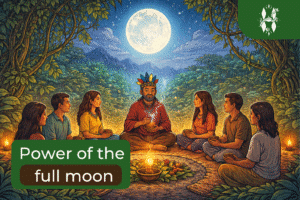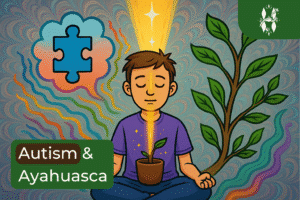In today’s world, mental health issues are reaching unprecedented levels. While Western medicine has provided various methods to address these concerns, many of them tend to scratch the surface without addressing the root cause. Often, the prescribed remedy is a pill or medication that pushes the problem aside, enabling individuals to continue with their daily lives. While this approach might offer temporary relief, it often falls short of providing a holistic solution, leaving many unsatisfied.
Because of this individuals worldwide are in search of alternatives that can genuinely transform their mental state, yearning for genuine relief, peace, happiness, joy, and love. These ideals may seem distant, almost unattainable, for those grappling with severe mental health challenges. However, with the right interventions, they can be realized. Ayahuasca, promises potential in this regard. Let’s dive deeper into understanding how Ayahuasca can play a significant role in mental well-being.
Key takeaways:
- Many of the mental health struggles we face are related to the way we life our lifes, The lack of direction, societal pressures, transactional relationships etc. create a disharmony within us that we experience as mental health problems.
- By getting to know yourself better, becoming confident in the person you are, start liking and loving the person you are, know the direction for your life, how you want to contribute in your community will help you overcome many of the mental health challenges you face.
- These often involve deep emotional processes that Ayahuasca can assist you with.
Table of Contents
Get Ready: A personal viewpoint on mental health
Mental health is an incredibly delicate topic, one that requires our empathy and understanding. My experiences, particularly living in Colombia, have opened my eyes to the diverse spectrum of severe problems that people face. It’s in these moments that I’m reminded of how I don’t have problems, i have some difficulties that I am facing.
There have been countless times when I’ve encountered individuals in dire circumstances, and my heart genuinely goes out to them. I pray for their strength and well-being. Through their stories, I’ve been prompted to reflect on my own challenges and, more often than not, I find that they pale in comparison. This perspective shift reminds me – and perhaps you, the reader – that many of our daily frustrations are just that, mere frustrations, rather than insurmountable problems.
Ayahuasca, in its profound way, has been known to assist many in purging built-up negative energies. It offers strength and resilience to individuals, empowering them to continue their journeys with renewed vigour.
I also firmly believe that a significant portion of the mental health challenges we see today, especially in the West, are self-inflicted. There’s a pervasive culture that, inadvertently, creates a victim mentality. Instead of addressing the root causes, many get trapped in the symptoms, often feeling justified in their pain. This is not to undermine genuine struggles but rather to address the phenomenon of dwelling in suffering.
In many instances, the core issues revolve around a fundamental disharmony with oneself and the divine (not want to go to deep into that topic in this blog), the universe, or however one chooses to interpret it.
But, regardless of the origin, there exists hope and potential solutions. There are ways to move past the chronic anxiety, depression, and other mental health challenges so rampant today. The first step? It demands an unflinching, honest look in the mirror, a willingness to reflect, accept, and then initiate change. It requires individuals to let go of attachments to their suffering and actively seek healing and growth.
Many individuals with autism also suffer from mental health challenges. We talk in a separate Blog about considerations around Ayahuasca and autism.
What are the origins of mental health problems:
Deeper issues which are difficult to deal with:
- childhood abuse, trauma, or neglect
- bereavement (losing someone close to you)
- having a long-term physical health condition
- homelessness
- being a long-term carer for someone
- domestic violence, bullying or other abuse as an adult
- significant trauma as an adult, such as military combat, being involved in a serious incident in which you feared for your life, or being the victim of a violent crime
- physical causes – for example, a head injury or a neurological condition such as epilepsy can have an impact on your behaviour and mood. (It’s important to rule out potential physical causes before seeking further treatment for a mental health problem).
Those are in more detail outlined in this blogpost
Various mental health issues inflicted by our lifestyle choices.
Many of our mental health challenges arise directly from the way we’ve structured our lives in modern Western society. It’s hard to ignore the overwhelming evidence that suggests our lifestyle choices, heavily influenced by societal pressures, play a significant role in creating these issues:
1. Conformity Over Authenticity: Many feel compelled to fit neatly into predefined boxes or cater to external expectations, often at the expense of their authentic selves.
2. The Comparison Trap: With the prevalence of social media and our connected world, it’s easier than ever to compare ourselves to others, leading to feelings of inadequacy and discontent.
3. Transactional Lives: A life lived calculating what one can gain from every interaction can feel hollow. When relationships become mere transactions, real connection suffers.
4. Superficial Bonds: Surface-level relationships can lead to feelings of isolation and loneliness, even when surrounded by people.
5. Detrimental Digital Habits: Spending time on X-rated websites or mindlessly consuming online content can negatively influence mental well-being.
6. Lack of Personal Vision: Without a clear sense of self or purpose, many simply adopt the desires and goals society prescribes, leading to a lack of fulfillment. (or have no goals at all)
7. Neglecting Physical Health: The mind and body are intrinsically linked. Neglecting physical well-being can have direct implications on mental health.
8. Unresolved Family Dynamics: Childhood and ongoing parental issues often cast long shadows over adult lives, influencing behaviors and thought patterns.
9. Inauthentic Expression: Suppressing emotions or not communicating true feelings can lead to internal turmoil.
10. Disconnection from Nature: Our increasingly urbanized lives have distanced many from the rejuvenating power of nature.
11. Spiritual Disconnection: Whether one believes in a higher power or the collective consciousness, many feel detached from any spiritual or larger cosmic connection.
12. Overthinking: Spending too much time ruminating can lead to anxiety, depression, and other mental health challenges.
13. Greed Over Generosity: A constant desire for more, rather than finding joy in giving, can lead to feelings of emptiness.
14. Consumer vs. Giver Mindset: The constant drive to consume – be it material goods or experiences – contrasts with the fulfillment derived from giving and helping others.
15. Past Mistakes: Mistakes, especially those that hurt loved ones or stem from being hurt by them, can leave lasting scars if not processed and forgiven.
16. The Ruthless Inner Critic: Constant negative self-talk and a relentless inner critic can erode one’s self-worth and confidence over time.
Understanding these lifestyle-induced stressors is the first step towards mitigating their impact. Recognizing them, challenging them, and making conscious choices can pave the way for improved mental well-being.
Tips to overcome mental health struggles:
Generally doing things which are good for you:
- Get closer to nature. …
- Learn to understand and manage your feelings. …
- Talk to someone you trust for support. …
- Be aware of using drugs and/or alcohol to cope with difficult feelings. …
- Try to make the most of your money and get help with debt problems. …
- Get more from your sleep.
- be kind and help create a better world
- keep moving
- eat healthy food
- Be curious and open minded to new experiences
- Plan things to look forward to
The points are highlighted in more details in this article by mentalhealth.org.uk. These tipps are helpful, however I feel like they only scratch the surface and are not addressing the root of our self created suffering. Let’s take a deeper look, what can actually shift you into a person who overcomes those types of struggles:
Certainly! Here’s an elaborated version of the solutions you’ve suggested for self-inflicted mental health issues:
Ayahuasca and mental health: How to address the underlying issues
When we recognize the areas of our life that contribute to our mental unrest, the path to healing and well-being becomes clearer. Many of these are internal challenges, deeply rooted in our psyche. Overcoming them involves intentional actions and often a deep reevaluation of one’s life:
1. Self-Acceptance: Embrace who you are, warts and all. This includes accepting past mistakes, choices, and experiences that have shaped you. Remember, it’s the entirety of your journey that makes you unique.
2. Forgiveness: Holding onto resentment or regrets is like carrying a heavy load. Learn to forgive yourself and others, not just for their sake, but especially for your own peace.
Must read blog: The power of forgiveness through Ayahuasca
3. Courageous Conversations: Addressing issues head-on, no matter how difficult or uncomfortable, can lead to resolution and a lightening of the heart.
4. Family Ties: Families are complex, filled with various personalities and histories. Attempt to resolve family conflicts, understanding that it’s a two-way street. Even if full resolution isn’t achieved, your efforts will bring you one step closer to peace.
5. Unconditional Love for Parents: Our parents, with all their flaws, are a crucial part of who we are. Loving them, even if they didn’t always meet our expectations, can heal deep-seated wounds. This doesn’t mean you have to agree with everything they did or the way they live their lifes. But the gratitude and love for giving you this life on this earth.
6. Physical Well-being: The connection between the body and the mind is profound. Prioritize getting in shape, understanding that physical well-being translates to mental well-being.
7. Vision and Purpose: Having a clear vision or life purpose acts as a compass during challenging times. It’s essential to ask oneself: What life do I envision? What purpose fuels my life?
Must read Blog: Ayahuasca purpose – can Ayahuasca help you discover your purpose?
8. Live life from the inside out: Instead of being swayed by external circumstances, focus on creating your life from the inside out, in alignment with your values and desires.
9. Deep Relationships: Cultivate relationships based on mutual respect and genuine connection rather than just transactions. This deep bond brings immeasurable comfort and support.
10. Find Your Tribe: Surround yourself with individuals who uplift you, share your values, and are walking a similar path. There’s strength in unity and shared purpose.
11. Gratitude: One of the most potent tools for mental well-being is gratitude. Regularly count your blessings. By focusing on what you have, you shift your mindset from scarcity to abundance. The key is not just to list the things that you are grateful for but to actually feel the gratitude.
Making these intentional changes can be daunting, but with each step, the weight of past burdens will lighten. Mental health is a journey, not a destination, and every positive step you take contributes to a happier, more fulfilling life.
How Ayahuasca impacts mental health
This is where Ayahuasca comes into play. Of course, you can start addressing all of those topics by yourself, or working with a therapist. However, Ayahuasca can help accelerate the emotional processes behind each of those steps.
1. Acceptance of Reality: Ayahuasca can help instill a profound understanding that resisting the current situation only amplifies suffering. Embracing and accepting where you are is the first step to moving forward.
2. Processing Past Trauma: Ayahuasca can provide a safe space forprocessing events from the past, allowing for a deeper understanding and eventual healing.
3. Clarity on Changeable Aspects: Through visions or insights, Ayahuasca can offer clarity on the areas of life that are within one’s control to change, helping focus energy and intention on actionable steps.
4. Emotional Shifts: Reading about change and actually feeling it deep within are two different things. Ayahuasca has the potential to facilitate these deep emotional shifts, making concepts like forgiveness feel attainable.
5. **Release and Purging:** One of the most well-known aspects of the Ayahuasca experience is purging. This can be a cathartic release of energies, emotions, and patterns that no longer serve your highest good.
Must read Blog: Ayahuasca vomit explained – Why you vomit on Ayahuasca
6. Lightening the Load: As you process, release, and shift, life begins to feel less burdensome. The heaviness that once seemed an ever-present companion starts to lift, making way for a lighter, more joyful existence.
Conclusion: Ayahuasca and mental health
It’s crucial to remember, however, that Ayahuasca is not a magic pill. It offers a door, an opportunity. The real work lies in how one integrates the insights and lessons from the experience into daily life. With the right guidance and support, the Ayahuasca retreat can be a transformative tool on the path to wholeness and well-being.
The mental health challenges faced by many today are multifaceted and deeply intertwined with the way we’ve structured our lives in modern society. And there are ways you can start changing, starting to get to know yourself, become confident in the person you are, start liking and loving the person you are, know the direction for your life, how you want to contribute.
All of this will help you tremendously with facing the mental health challenges that you are experiencing.
FAQs:
Is Ayahuasca good for your mental health?
Ayahuasca in most cases is benefitial for you mental health as indicated by this study:
It helps with processing emotional pain of the past, releasing stuck negative energy in our body and to see things from a new perspective which helps with the mental health struggles one experiences.
How does Ayahuasca affect mental health?
Ayahuasca affects our mental health because you start to go deep inside your psyche. You start to understand yourself on a deeper level, what is good for you and what causes you suffering. By than engaging in activities and patterns that are beneficial for you, it can positively influence your mental state.
How can Ayahuasca negatively impact your mental health?
Ayahuasca can temporarily negative impact your mental health. It can show you your patterns and the confrontation with those patterns can cause a level of anxiety and stress within you. However, these incidents are for you to learn and to understand what is not serving you any more so you can start changing these patterns of your life.






